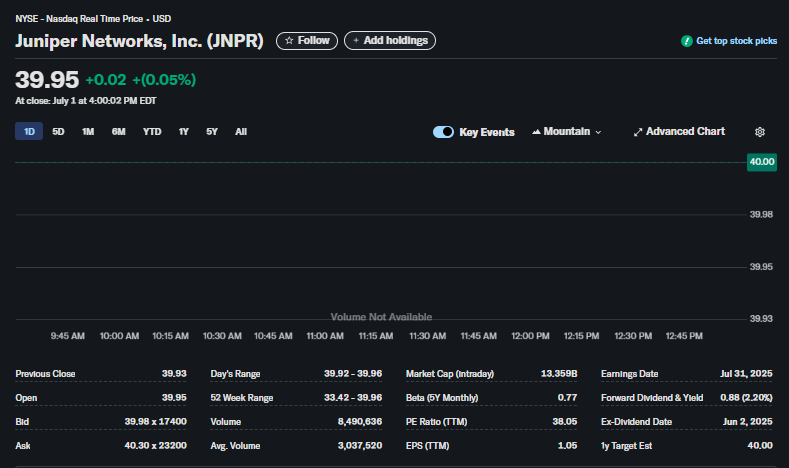Juniper Networks Stock (JNPR) Hovers Near 52-Week High in Quiet Trading

New York – Shares of Juniper Networks, Inc. (JNPR) concluded the trading day on July 1st with minimal change, reflecting a period of price consolidation for the networking equipment company. The stock closed at $39.95, a nominal increase of just $0.02 or 0.05%.

The day’s trading was characterized by an extraordinarily narrow range. After opening at $39.95, the stock fluctuated between a low of $39.92 and a high of $39.96, a tight 4-cent spread. This price point places the stock directly at its 52-week high, a level it has maintained recently.
Despite the lack of price volatility, trading volume was robust. Over 8.4 million shares were exchanged, which is more than double the company’s average daily volume of approximately 3 million shares. This combination of high volume and minimal price movement is highly unusual and points to a specific market dynamic influencing the stock.
The reason for this price behavior is the pending acquisition of Juniper Networks by Hewlett Packard Enterprise (HPE). The deal, announced earlier this year, is an all-cash transaction for $40.00 per share. Consequently, JNPR stock is now trading as an arbitrage play, pinned to this acquisition price. The small difference between the current price and the $40.00 offer reflects the time value of money and the minimal perceived risk that the deal will not be completed.
Should You Buy or Sell JNPR Stock Today?
Given the pending acquisition, the decision to buy or sell JNPR is not based on the company’s standalone performance but on the acquisition’s status.
-
Potential for Buyers: The primary reason to buy JNPR at this stage is for deal arbitrage. An investor buying at $39.95 would be betting on capturing the remaining $0.05 spread when the acquisition by HPE is finalized. This represents a low-risk, low-return scenario contingent on the deal closing.
-
Caution for Sellers: Investors might choose to sell to free up capital for other opportunities rather than waiting for the deal to finalize, as the potential upside is very limited. The only significant risk is the unlikely event that the acquisition fails, which would likely cause the stock price to fall significantly from its current level.
Our Opinion on Juniper Networks (JNPR)
The investment case for Juniper Networks has fundamentally changed. The stock is no longer trading based on its earnings, product cycle, or industry trends. Its value is almost entirely tied to the $40.00 per share cash offer from HPE. Therefore, any analysis of JNPR stock must focus on the likelihood and timeline of the acquisition’s completion. For most retail investors, the potential gain of a few cents per share may not justify tying up capital until the deal closes. It is now a stock primarily for arbitrage specialists.
Disclaimer: This article is for informational purposes only and should not be considered financial advice. Investing in the stock market involves risk, and you should consult with a qualified professional before making any investment decisions.
Frequently Asked Questions (FAQ) about JNPR Stock
1. What was the closing price of Juniper Networks (JNPR) stock?
Juniper Networks stock closed at $39.95 per share on July 1st.
2. Why is JNPR stock trading in such a narrow price range?
The stock’s price is anchored by the pending all-cash acquisition offer of $40.00 per share from Hewlett Packard Enterprise (HPE). This effectively creates a price ceiling near $40.00.
3. What is the 1-year analyst target for JNPR?
The 1-year target estimate for JNPR is $40.00, which aligns precisely with the HPE acquisition price.
4. Is Juniper Networks a profitable company?
Yes. Based on the provided data, Juniper has a trailing twelve-month (TTM) Earnings Per Share (EPS) of $1.05.
5. Does JNPR stock pay a dividend?
Yes, Juniper Networks offers a forward dividend of $0.88 per share, which corresponds to a yield of approximately 2.20% at the current price.
6. Why was the trading volume so high if the stock price barely moved?
The high volume is likely driven by arbitrage traders and institutional investors buying and selling shares to capture the small spread between the market price and the $40.00 acquisition price, or to adjust positions as the deal’s closing date approaches.
